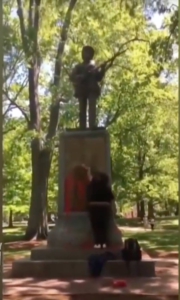
On April 30, Maya Little held a symbolic protest at the University of Chapel Hill’s Silent Sam Confederate monument using their own blood and red ink to highlight the racist violence that these statues represent, after which Little was arrested and charged with defacing a public monument. On Oct. 15, Little went to district court where the judge found them guilty of misdemeanor defacing of a public monument, but was not sentenced. Instead, the judge entered a “Prayer of Judgement” which will result in no legal consequences against Little beyond the guilty verdict remaining on their record.
On Oct. 25, Little went before the UNC Honor Court. Little and other organizers used this trial as an opportunity to hold a memorial for James Cates, who was murdered on UNC campus in 1970.Cates, an anti-racist leader who lived in Chapel Hill, had been involved in the sit-ins during the civil rights movement.
In 1970, a neo-Nazi group, known as the Storm Troopers, used the chaos immediately following a football game to repeatedly stab Cates on campus. People attempted to get Cates to a car to drive him to the hospital, but for over 30 minutes, police prevented him from being moved while he bled to death. His murderers went free with some still residing in the area. A memorial was held at the site where Cates was murdered with people bringing flowers to lay before a poster explaining James Cates’ life and death, and Maya Little spoke about the murder connecting it to present-day white supremacist and state violence.
The campus honor court mainly hears cases of student cheating. This court has the ability to suspend students (effectively severing grad student workers from their income) and to recommend expulsions, and does not require the same level of proof as that found in the criminal justice system in order to find someone guilty of a violation.
The members of the honor court panel–like a jury–were not made known until the beginning of proceedings. Among the panelists was Frank Pray, a law student and known supporter of Silent Sam. When he was recognized, Little asserted that he was incapable of being impartial. As it turns out, that very day Pray had deleted social media posts revealing his support for Silent Sam and disrespectful attitude toward anti-racist activists, calling one professor and activist, “a petulant child.”
Despite this seemingly obvious conflict of interest, Pray refused to recuse himself and the panel presiding officer claimed it was too late to challenge the composition of the panel. Little decided there was no way of getting a fair trial and walked out of the proceedings which continued in absentia.
Supporters, especially those among the the UNC grad students union, were prepared to respond if the university attempted suspension or expulsion, but the final sentence was 18 hours of community service with no restitution. This, along with Little’s “prayer of judgment” verdict, show the strength of the struggle against racism. The powers that be clearly feared backlash that would have exploded in the community and on campus had Little been expelled, suspended or sentenced to jail.





